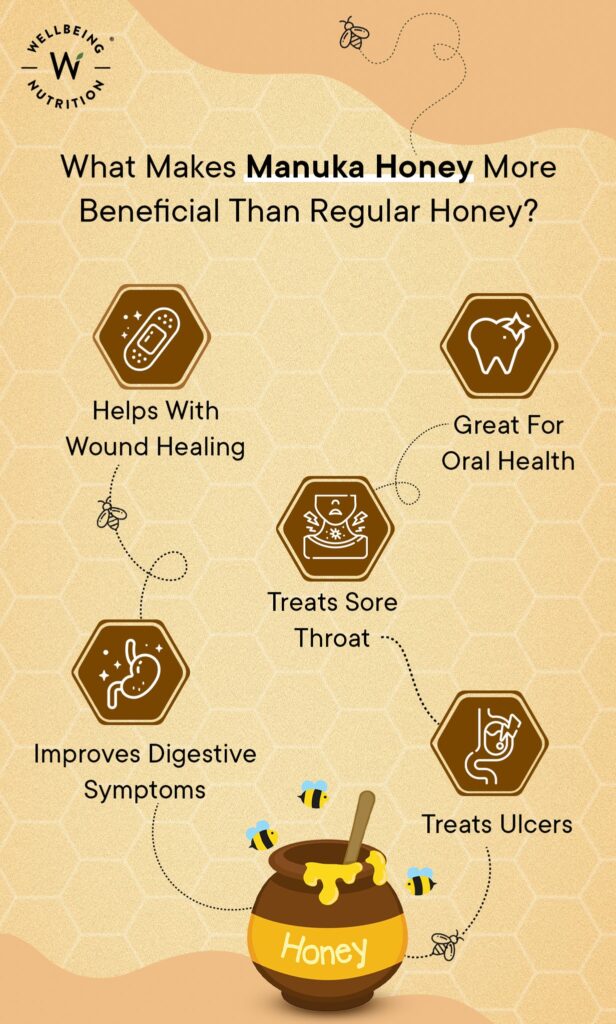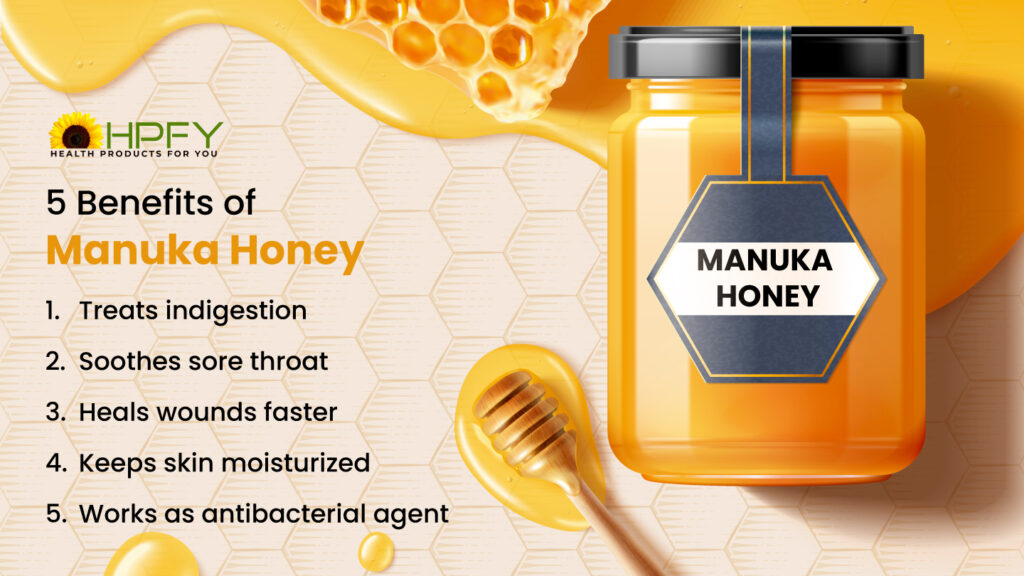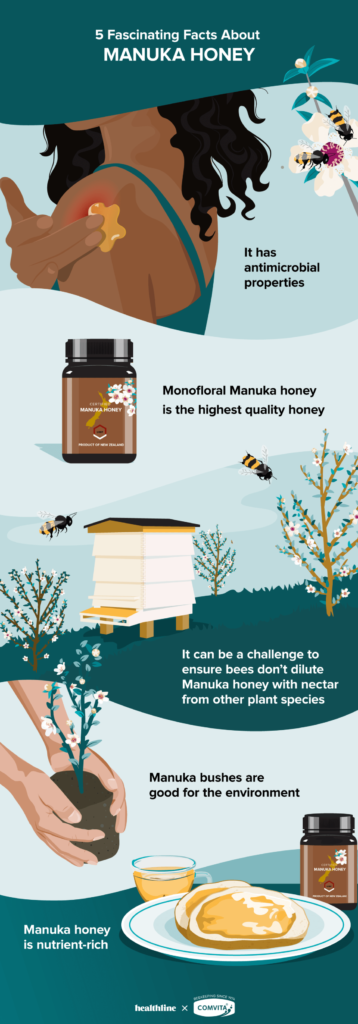
Manuka honey, with its unique properties and remarkable health benefits, has become a popular choice for individuals seeking natural alternatives for their overall well-being. Packed with antibacterial, antiviral, and anti-inflammatory properties, Manuka honey has proven to be a powerful aid in boosting the immune system, promoting digestive health, and soothing skin irritations. With its high concentration of methylglyoxal (MGO) 263, this sweet and golden elixir has been hailed as a superfood, providing an array of health-enhancing qualities that can significantly contribute to your overall health and wellness.
Antibacterial Properties
Manuka honey is a special type of honey that is known for its potent antibacterial properties. It is derived from the nectar of the Manuka tree, which is native to New Zealand. The unique thing about Manuka honey is its high concentration of a naturally occurring compound called methylglyoxal (MGO). MGO is responsible for the antibacterial effects of Manuka honey, making it a powerful natural remedy for fighting against harmful bacteria.
What is Manuka Honey?
Manuka honey is a type of honey produced by bees that gather nectar from the flowers of the Manuka tree. This tree, also known as Leptospermum scoparium, is native to New Zealand and has been used for centuries by the indigenous Maori people for its medicinal properties. The bees collect the nectar and transform it into honey by adding enzymes. The result is a thick, dark honey with a distinctly rich and earthy flavor.
The Unique Antibacterial Activity
What sets Manuka honey apart from other types of honey is its unique antibacterial activity. While all types of honey have some level of antimicrobial activity due to their high sugar content and low water content, Manuka honey contains a significantly higher level of a compound called methylglyoxal (MGO). MGO has been found to have strong antibacterial properties, and the higher the MGO content of the honey, the greater its antibacterial activity.
How Manuka Honey Kills Bacteria
The antibacterial activity of Manuka honey is thought to be due to several factors. First, the high sugar content of honey creates an osmotic effect, causing bacteria to lose water and dehydrate. This inhibits their growth and ability to replicate. Second, the acidity of honey creates an unfavorable environment for bacteria to thrive. Finally, the MGO found in Manuka honey is believed to directly target and kill bacteria, making it an effective natural antibiotic.
Effective against Antibiotic-Resistant Bacteria
One of the most remarkable aspects of Manuka honey’s antibacterial properties is its ability to combat antibiotic-resistant bacteria. In recent years, there has been a rise in the number of bacteria that are resistant to commonly used antibiotics. This has led to an urgent need for alternative treatments. Studies have shown that Manuka honey can effectively kill antibiotic-resistant bacteria, making it a valuable tool in the fight against these dangerous pathogens.
Promotes Wound Healing
The healing properties of Manuka honey make it an excellent natural remedy for promoting wound healing. It has been used for centuries to treat cuts, burns, and ulcers due to its antimicrobial, anti-inflammatory, and tissue-regenerating properties.
How Manuka Honey Helps Heal Wounds
When applied topically to wounds, Manuka honey creates a moist environment that promotes the growth of new tissue and prevents the formation of scar tissue. It also acts as a barrier, protecting the wound from infection and reducing the risk of complications. The antibacterial properties of Manuka honey help to kill any bacteria present in the wound, preventing infection and promoting faster healing.
Stimulates Tissue Regeneration
Manuka honey has been found to stimulate the growth of new tissue, which is essential for wound healing. It contains specific proteins and enzymes that promote cell proliferation and migration, leading to the formation of new tissue. This helps wounds to heal faster and reduces the risk of scarring.
Reduces Inflammation
Inflammation is a natural response of the body to injury or infection. However, chronic inflammation can delay the wound healing process. The anti-inflammatory properties of Manuka honey help to reduce inflammation in wounds, allowing the healing process to proceed more efficiently.
Manuka Honey for Treating Burns and Ulcers
The soothing and healing properties of Manuka honey make it particularly beneficial for treating burns and ulcers. The honey forms a protective barrier over the affected area, preventing infection and promoting healing. It also helps to reduce pain and inflammation, providing relief to those suffering from burns or ulcers.

Boosts Immune System
Manuka honey is not only a delicious sweet treat but also a natural immune booster. It contains a wide range of nutrients and bioactive compounds that support a healthy immune system and enhance overall immune function.
Nutritional Composition of Manuka Honey
Manuka honey is rich in essential vitamins, minerals, and antioxidants that support immune health. It contains vitamins B complex, vitamin C, calcium, zinc, and iron, all of which play a crucial role in maintaining a strong immune system. These nutrients help to enhance the production and activity of immune cells, ensuring that your body is well-equipped to fend off infections and diseases.
Antioxidant Effects
Antioxidants are compounds that help to protect the body against damage caused by free radicals. Manuka honey contains a variety of antioxidants, including flavonoids, phenolic acids, and enzymes. These antioxidants help to neutralize harmful free radicals and reduce oxidative stress, which can weaken the immune system. By consuming Manuka honey regularly, you can boost your body’s antioxidant defenses and support optimal immune function.
Stimulates Immune Cells
Manuka honey has been found to stimulate the activity of immune cells, such as neutrophils and macrophages, which play a crucial role in the body’s defense against pathogens. These immune cells help to identify and eliminate foreign invaders, keeping you healthy and protected against infections. Regular consumption of Manuka honey can help to enhance the activity of these immune cells, strengthening your immune system.
Enhances Overall Immune Function
By promoting a healthy immune system, Manuka honey enhances overall immune function. A strong immune system is better equipped to fight off infections and diseases, allowing you to stay healthier and more resistant to illness. Incorporating Manuka honey into your daily routine can help to support your immune system and provide an extra line of defense against common illnesses.
Digestive Health
In addition to its antibacterial and immune-boosting properties, Manuka honey also offers several benefits for digestive health. It has been used for centuries to soothe digestive complaints and promote a healthy gut.
Soothing Effects on Digestive Tract
Manuka honey has a soothing effect on the digestive tract, making it an excellent natural remedy for common digestive complaints such as indigestion, acid reflux, and gastritis. It helps to reduce inflammation and irritation in the gastrointestinal lining, providing relief from discomfort and promoting healing.
Anti-Inflammatory Benefits
Chronic inflammation in the digestive system can lead to a range of digestive disorders, including inflammatory bowel disease (IBD) and irritable bowel syndrome (IBS). The anti-inflammatory properties of Manuka honey help to reduce inflammation in the gut, relieving symptoms and improving overall digestive health.
Assists in Digestive Disorders
Manuka honey has been found to be beneficial for individuals suffering from digestive disorders such as gastric ulcers, stomach infections, and gastrointestinal infections. Its antibacterial properties help to kill harmful bacteria in the digestive system, while its anti-inflammatory effects reduce inflammation and promote healing. Regular consumption of Manuka honey can help to alleviate symptoms and support the healing of digestive disorders.
Promotes Healthy Gut Microbiota
The health of the gut microbiota is essential for overall digestive health. Manuka honey has prebiotic properties, meaning it provides nourishment for beneficial bacteria in the gut. By promoting the growth of good bacteria and inhibiting the growth of harmful bacteria, Manuka honey helps to maintain a healthy balance of gut microbiota, supporting optimal digestive function.

Maintains Oral Health
Oral health is crucial for overall health and well-being, and Manuka honey can play a significant role in maintaining a healthy mouth. It has been used for centuries as a natural remedy for various oral conditions, thanks to its powerful antimicrobial and anti-inflammatory properties.
Manuka Honey for Oral Care
Manuka honey can be used as an effective natural alternative to conventional oral care products. Its natural antibacterial properties help to kill harmful oral bacteria, reducing the risk of tooth decay, gum disease, and bad breath. It can be used as a mouthwash, toothpaste, or applied directly to the affected area for targeted relief.
Eliminates Harmful Oral Bacteria
The antibacterial activity of Manuka honey makes it effective against harmful oral bacteria such as Streptococcus mutans, which is a major contributor to tooth decay. Regular use of Manuka honey as part of your oral care routine can help to eliminate these bacteria, preventing plaque formation and promoting a healthier mouth.
Prevents Dental Plaque Formation
Plaque is a sticky film that forms on the teeth and can lead to tooth decay and gum disease if not properly removed. Manuka honey has been found to inhibit the formation of dental plaque, thanks to its antibacterial properties. Incorporating Manuka honey into your oral care routine can help to keep your teeth and gums healthy and reduce the risk of oral diseases.
Relieves Sore Throat and Gingivitis
The anti-inflammatory and soothing properties of Manuka honey make it an excellent natural remedy for sore throat and gingivitis. Drinking warm water with Manuka honey or gargling a mixture of Manuka honey and warm water can help to soothe inflammation and relieve discomfort. Applying Manuka honey directly to the gums can also provide relief from gingivitis symptoms.
Relieves Respiratory Symptoms
If you’re dealing with common respiratory issues such as cough and cold, Manuka honey can provide relief and support the healing process. Its natural antimicrobial and anti-inflammatory properties make it an excellent choice for soothing respiratory symptoms.
Manuka Honey and Common Respiratory Issues
Manuka honey has been used for centuries as a natural remedy for respiratory infections, coughs, and colds. Its antimicrobial properties help to kill harmful bacteria and viruses, while its anti-inflammatory effects reduce inflammation in the airways. This helps to alleviate symptoms such as coughing, congestion, and sore throat.
Soothing Properties for Cough and Cold
The soothing properties of Manuka honey make it effective for relieving cough and cold symptoms. It helps to soothe an irritated throat, reduce coughing, and relieve congestion. Consuming a spoonful of Manuka honey or adding it to warm water or tea can provide quick relief from cough and cold symptoms.
Reduces Inflammation in Airways
Inflammation in the airways can make breathing difficult and worsen respiratory symptoms. The anti-inflammatory properties of Manuka honey help to reduce inflammation in the airways, promoting easier breathing and relieving symptoms such as wheezing and shortness of breath.
Potential Benefits for Asthma Patients
While Manuka honey is not a cure for asthma, it may provide some benefits for individuals with this chronic respiratory condition. Its antimicrobial and anti-inflammatory properties can help to reduce the frequency and severity of asthma attacks, providing some relief to asthma patients. However, it is essential to consult with a healthcare professional before using Manuka honey as a complementary treatment for asthma.

Natural Energy Boost
If you’re in need of a natural energy boost, look no further than Manuka honey. Its carbohydrate content, slow release of glucose, and reduced fatigue properties make it an excellent source of natural energy.
Carbohydrates and Energy
Carbohydrates are the body’s primary source of energy. Manuka honey is rich in carbohydrates, providing a quick and easily accessible source of fuel for the body. Consuming Manuka honey before physical activity or as a quick snack can help to replenish energy stores and improve endurance.
Slow Release of Glucose
Unlike refined sugars and artificial sweeteners, Manuka honey has a slow release of glucose into the bloodstream. This slow release of glucose helps to provide a steady and sustained supply of energy, preventing sudden spikes and crashes in blood sugar levels. This makes Manuka honey a healthier and more sustainable source of energy compared to other sweeteners.
Reduced Fatigue
Fatigue is a common issue that many people face, whether due to lack of sleep, physical exertion, or stress. The natural sugars in Manuka honey provide a quick energy boost, helping to combat fatigue and increase alertness. Its nutrient-rich composition also provides essential vitamins and minerals that support energy production and reduce fatigue.
Enhanced Exercise Performance
Manuka honey can be a beneficial addition to an athlete’s diet. Its natural sugars provide a readily available source of energy, which can improve exercise performance and endurance. Consuming Manuka honey before or during exercise can help to sustain energy levels and delay fatigue, allowing you to perform at your best.
Skin Care
Manuka honey is not only beneficial for internal health but also for maintaining healthy and radiant skin. Its nourishing and moisturizing properties, along with its ability to treat various skin conditions, make it a versatile ingredient in skincare products.
Nourishing and Moisturizing Properties
Manuka honey is excellent for moisturizing and nourishing the skin. It contains natural sugars and proteins that help to lock in moisture and prevent dehydration. Regular use of Manuka honey-based skincare products can help to keep the skin hydrated, soft, and supple.
Treatment for Acne and Eczema
Acne and eczema are common skin conditions that can be challenging to manage. The antibacterial and anti-inflammatory properties of Manuka honey make it a valuable treatment option for these conditions. It helps to kill acne-causing bacteria, reduce inflammation, and soothe irritated skin. Applying a thin layer of Manuka honey to affected areas or using skincare products containing Manuka honey can help to alleviate symptoms and promote healing.
Healing Properties for Skin Infections
Manuka honey has been used for centuries to treat various skin infections, including minor cuts, wounds, and burns. Its antimicrobial properties help to prevent infection and promote faster healing. Applying Manuka honey topically to the affected area and covering it with a bandage can accelerate the healing process and reduce the risk of complications.
Anti-Aging Effects
The antioxidants found in Manuka honey help to combat the damaging effects of free radicals, which can contribute to premature aging. Regular use of Manuka honey-based skincare products can help to reduce the appearance of fine lines, wrinkles, and age spots, promoting a more youthful and radiant complexion.
Supports Heart Health
Maintaining a healthy heart is vital for overall well-being, and Manuka honey can contribute to cardiovascular health. Its unique combination of antioxidants, cholesterol-lowering effects, and anti-inflammatory properties make it a heart-healthy food.
Cardiovascular Benefits
The antioxidants found in Manuka honey, including flavonoids and phenolic acids, help to reduce oxidative stress and protect the cardiovascular system from damage. They help to prevent the oxidation of LDL cholesterol, which can contribute to the development of heart disease.
Improves Cholesterol Levels
High levels of LDL cholesterol, often referred to as “bad” cholesterol, can increase the risk of heart disease. Manuka honey has been found to have cholesterol-lowering effects, helping to reduce LDL cholesterol levels in the blood. This can help to improve overall heart health and reduce the risk of cardiovascular diseases.
Antioxidant Effects on Heart
The antioxidants present in Manuka honey help to protect the heart from damage caused by free radicals. They help to prevent the oxidation of LDL cholesterol, reduce inflammation in the blood vessels, and promote overall cardiovascular health. Incorporating Manuka honey into your diet can provide a natural and delicious way to support heart health.
Reduces Inflammation in Blood Vessels
Inflammation in the blood vessels can contribute to the development of heart disease. The anti-inflammatory properties of Manuka honey help to reduce inflammation and promote a healthier cardiovascular system. By reducing inflammation in the blood vessels, Manuka honey can help to improve blood flow and reduce the risk of heart disease.
Lifestyle Uses
In addition to its health benefits, Manuka honey has a variety of other uses in daily life. Its unique flavor and nutritional profile make it a great addition to recipes, and its antibacterial properties can be utilized for food preservation and added to beverages.
Manuka Honey in Cooking
Manuka honey’s unique flavor profile adds depth and complexity to a wide range of dishes. Its rich, earthy flavor pairs well with both sweet and savory recipes. From marinades and dressings to desserts and baked goods, Manuka honey can be used as a natural and healthier alternative to processed sugars and sweeteners.
Sweetener with Potential Health Benefits
Replacing refined sugars with Manuka honey in your cooking and baking can provide potential health benefits. Unlike refined sugars, Manuka honey contains essential vitamins, minerals, and antioxidants that can support overall health. Using Manuka honey as a sweetener can help to reduce the consumption of processed sugars and promote a healthier lifestyle.
Enhancing Food Preservation
The antibacterial properties of Manuka honey make it an excellent option for food preservation. Its ability to inhibit the growth of harmful bacteria can help to extend the shelf life of certain foods. Manuka honey can be used as a natural preservative for homemade jams, jellies, and fruit preserves, preventing spoilage and maintaining freshness.
Added to Beverages and Smoothies
Manuka honey can be a delicious and nutritious addition to beverages and smoothies. Its natural sweetness and unique flavor make it a perfect sweetener for hot or cold drinks. Adding a spoonful of Manuka honey to your tea, coffee, or smoothie can provide a natural energy boost and enhance the taste.
In conclusion, Manuka honey offers a wide range of health benefits and can be used in various aspects of daily life. From its potent antibacterial properties and wound-healing abilities to its immune-boosting effects and support for digestive health, Manuka honey is truly a remarkable natural remedy. Incorporating Manuka honey into your daily routine can provide numerous benefits for your health and well-being, allowing you to enjoy the sweet taste of honey while reaping its many rewards. So why not indulge in a jar of Manuka honey and experience its incredible properties firsthand? Your body will thank you.
